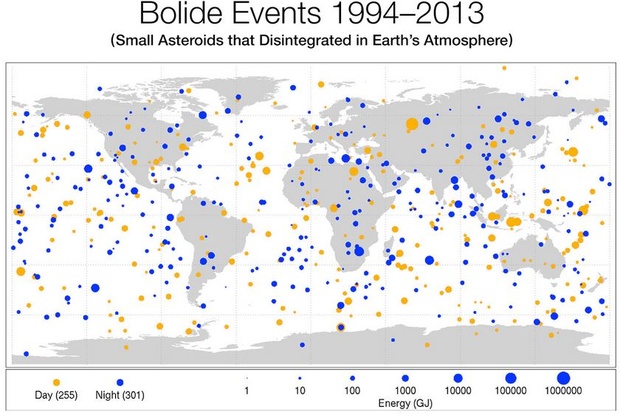Welcome to DU!
The truly grassroots left-of-center political community where regular people, not algorithms, drive the discussions and set the standards.
Join the community:
Create a free account
Support DU (and get rid of ads!):
Become a Star Member
Latest Breaking News
General Discussion
The DU Lounge
All Forums
Issue Forums
Culture Forums
Alliance Forums
Region Forums
Support Forums
Help & Search
Science
Related: About this forumSpace rock impacts not random
When it comes to small space rocks blowing up in Earth’s atmosphere, not all days are created equal. Scientists have found that, contrary to what they thought, such events are not random, and these explosions may occur more frequently on certain days. Large objects can survive a trip through Earth’s atmosphere relatively intact, but many smaller bodies break up at high altitude, sometimes in an immense burst of energy. Researchers used data from sensors designed to detect clandestine nuclear tests, among other sources, to identify airbursts with an energy equivalent to or larger than that released by 1 kiloton of exploding TNT. Between 2000 and 2013, they identified 33 such events (including the meteoroid that blazed into the atmosphere and detonated over Chelyabinsk, Russia, in February 2013, see image; the large blip in the meteor trail at right denotes where the 500-kiloton airburst occurred). Of those events, there were nine pairs of explosions—or airbursts—that occurred within one calendar day of each other, the researchers will report in January in the Monthly Notices of the Royal Astronomical Society. There’s a less than 2% chance of finding nine such pairs in a random sample, the researchers note. The data set also sports 16 pairs of events with three or fewer calendar days’ difference, which for a random sample could be statistically expected only about 2.2% of the time—a number of coincidences that is simply too high to be the result of chance alone, the researchers contend. Rather than random occurrences, many large airbursts might result from collisions between Earth and streams of debris associated with small asteroids or comets. The new findings may help astronomers narrow their search for objects in orbits that threaten Earth, the researchers suggest.
http://news.sciencemag.org/earth/2014/11/space-rock-impacts-not-random
http://news.sciencemag.org/earth/2014/11/space-rock-impacts-not-random
InfoView thread info, including edit history
TrashPut this thread in your Trash Can (My DU » Trash Can)
BookmarkAdd this thread to your Bookmarks (My DU » Bookmarks)
5 replies, 1031 views
ShareGet links to this post and/or share on social media
AlertAlert this post for a rule violation
PowersThere are no powers you can use on this post
EditCannot edit other people's posts
ReplyReply to this post
EditCannot edit other people's posts
Rec (2)
ReplyReply to this post
5 replies
 = new reply since forum marked as read
Highlight:
NoneDon't highlight anything
5 newestHighlight 5 most recent replies
= new reply since forum marked as read
Highlight:
NoneDon't highlight anything
5 newestHighlight 5 most recent replies
Space rock impacts not random (Original Post)
jakeXT
Nov 2014
OP
1StrongBlackMan
(31,849 posts)1. Oh ...
Rather than random occurrences, many large airbursts might result from collisions between Earth and streams of debris associated with small asteroids or comets.
I thought the scientists were going to conclude that someone/thing was throwing stuff at us ... perhaps in retaliation for us launching stuff at them!
GeorgeGist
(25,323 posts)2. So who's throwing rocks at us?
JHB
(37,162 posts)4. Those annoying aliens
True Blue Door
(2,969 posts)3. Naturally it wouldn't be totally random.
Most asteroid swarms are fragments of larger bodies that were shattered in ancient impacts and still follow each other.
Igel
(35,359 posts)5. And even if the distribution started off random,
and there's been a lot of mixing since then, they've still had 4 1/2 billion years to let the distribution get lumpy.
